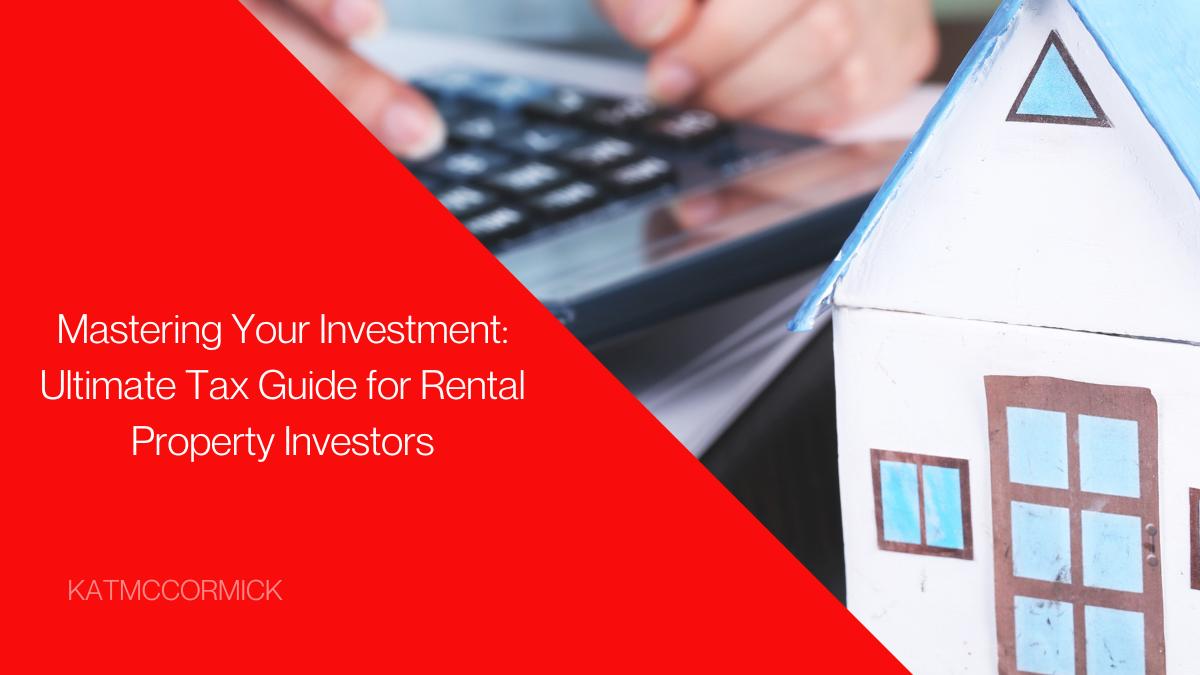An investment in rental properties offers the chance for both stable income and capital growth. However, in order to get the most out of their investment, landlords need to understand the intricacies of tax law. This manual will help you design a tax strategy that maximizes your returns while being compliant by delving into the key tax factors any investor in rental property should be aware of.
Tax Considerations for Rental Property Investors
The tax ramifications of owning and managing rental properties can have a major effect on one’s financial situation. Let’s dive into the main tax factors to think about when investing in rental property to assist you wade through these murky waters.
1. Understanding Rental Income Taxation
The cash flow from a rental property should not be confused with the taxable income it generates. Rental income is your cash flow, whereas your taxable income is the amount left over after expenses have been subtracted.
2. Deductible Expenses
Investors in rental properties can save a lot of money thanks to tax deductions for things like repairs, insurance, management fees, and mortgage interest. Your taxable rental income may be drastically lowered by taking advantage of these deductions.
3. Depreciation Benefits
Wear and tear on an asset can be written off over time through a process called depreciation. Significant tax savings may result from deducting this non-cash expense from your taxable rental revenue.
4. Capital Improvements vs. Repairs
It is crucial that you recognize the distinction between repairs and major improvements. Capital upgrades are normally depreciated over time, although repairs can be expensed in the current year. Correctly categorizing costs guarantees honest tax filing.
5. Passive Activity Loss Rules
Your ability to deduct losses from rental properties against other sources of income may be impacted by the IRS’s rules governing passive activity losses. Learn these guidelines and maximize your tax breaks.
6. 1031 Exchange Opportunities
By investing the proceeds from the sale of one investment property into another “like-kind” investment property, you can defer capital gains tax under Internal Revenue Code Section 1031. For investors looking to make a long-term commitment, this tactic can have significant tax benefits.
7. Short-Term vs. Long-Term Rentals
Short-term rentals (like holiday rentals) and long-term rentals (like corporate housing) have different tax implications. It is imperative that you understand the precise rules that affect your renting approach.
8. Self-Employment Tax
Rental income is typically exempt from self-employment tax because of its passive nature. However, if your business involves managing properties, you might have to pay this tax. Make sure you understand your part in calculating your tax bill.
9. State and Local Taxes
Investors in rental properties face many tax burdens, not just federal but also state and municipal. Find out what the local tax laws are so that you can follow them.
10. Record Keeping and Documentation
For precise tax reporting, it is essential to keep detailed records of all income and expenditures. Make tax time less of a headache by using software or tools that simplify this procedure.
FAQs
Can I Deduct Home Office Expenses for My Rental Property?
You can deduct some of your utilities and internet service fees for a home office that you use only for managing rental properties.
How Does Depreciation Work for Rental Properties?
With depreciation, you can write off the price of an asset over the years it serves its purpose. Commercial buildings are depreciated over 39 years, while homes are written off over 27.5 years.
Are Repairs Deductible in the First Year?
Your taxable rental income might be reduced by the full amount of any usual and necessary repairs made to keep the property in good condition.
What Is a Passive Loss?
When your rental property’s costs surpass your income, you are making a passive loss. Depending on IRS rules, you may be able to offset these losses with your other passive income.
Can I Do a 1031 Exchange for Any Property?
No, a 1031 exchange can only be done between “like-kind” (same in nature) properties. Get the advice of a tax expert to make sure your properties qualify.
Do I Need to Collect and Remit Sales Tax for Short-Term Rentals?
Short-term rentals are often subject to sales or lodging taxes. Find out if collecting and remitting these taxes is required under local law.
Final Words
One of the most important parts of constructing a profitable real estate investment portfolio is understanding and navigating the tax implications of investing in rental properties. You can better match your tax plan with your financial goals by learning the ins and outs of rental income taxation, deductible expenses, and strategic techniques like 1031 exchanges. Keep in mind that the key to making the most of your rental property investments is to keep learning and to seek expert guidance when needed.
- Key Strategies to Mitigating risks in Rental Property Investments
- The Essential Role of Property Management Companies
- The Ultimate Guide to Handling Evictions and Tenant Conflicts
- The Hidden Impact of Taxes and Insurance Costs
- Protect Your Property: Essential Practices for Effective Tenant Screening

